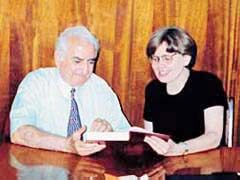|
Autumn 1998 (6.3) Linguistic Milestones by Oruj Musayev
Related Article Some of the greatest inventions and contributions to intellectual history are made under conditions that are far from ideal. This can be said as well about the new Azerbaijani-English dictionary published in the new modified Latin script, which just came off the press this July. Oruj Musayev, Vice Rector of the Institute of Foreign Languages and the dictionary's editor and compiler, describes what went into the making of this 45,000 term dictionary - an effort that took 25 years. This new dictionary is a landmark in the linguistic history of Azerbaijanis. It's the first time that a comprehensive bilingual Azerbaijani-English dictionary has been published in the new Latin alphabet. For the 7.5 million Azerbaijanis who grew up in the Soviet Republic of Azerbaijan, undoubtedly it will have a profound effect on their learning English. In the past, they always had to learn English as a third language after mastering Russian. And for the 25 million Azerbaijanis living in Iran and abroad, it will serve as a benchmark for their pride and ethnic identity.
It wasn't until after World War II that I first had a chance to study English. I had just graduated from high school in 1948 and entered technical school. After the war, of course, English was considered one of most prestigious languages in the world, and I decided I would try to find a way to study it. Up until then, German was the only foreign language I had studied But the conditions were not very supportive for learning English in Soviet Azerbaijan. Russians who dominated the political system wanted us to learn Russian. They insisted that the peoples of the Soviet Union - all 15 republics who spoke numerous mother tongues - should first be able to communicate with one another in Russian. Therefore, English was shoved to the side and given little attention. At that time, we had no native English-speaking teachers in Azerbaijan. Nor were there any native Azerbaijani specialists who taught English - only Russians, Armenians and Jews who didn't know Azeri. So at school, all grammar explanations were made in Russian. For many of us, it meant having to master Russian before getting a chance to study English - an excruciatingly long and tortuous process. Nor did we have audio-visual materials like they do today - no TV programs, no tapes, no videos - nothing. I myself have never, even to this day, had a chance to travel outside of Azerbaijan to visit an English-speaking country. Our one textbook, "Shivadshev" named in honor of its compiler, was written in Russian. We were in desperate need of a bilingual dictionary and that's when I made up my mind to someday write one myself. That was in the 1950s. Difficulties Compiling any dictionary is exacting and tedious work. For me, it was even more difficult because I didn't have much extra time as I was supervising numerous postgraduate students at the teachers' training college where I headed the English Grammar Department. Of course, back then, we didn't have access to computers either, and so the job was done on two manual typewriters: English and Azeri Cyrillic. I can't tell you how many restless days and sleepless nights it took to complete this ocean of toil. Finally, when the dictionary was ready, I faced another difficulty - money. By then, the Soviet Union had collapsed and we were suffering from severe economic difficulties. No longer could I count on the State to finance the project, and I didn't have enough money to print it on my own. Breakthrough Now that the Latin version dictionary is out, my goal is to get it in the hands of as many people as possible, especially students. Along with other experts such as Edison Hajiyev and various others of the Foreign Language Institute who were involved with earlier stages of the dictionary preparation, we continue to press for the companion volume, an English-Azerbaijani dictionary and also for an abridged pocket version. For quite some time, Blair has been pushing for a CD-ROM version and a Spell Check in Latin which Exxon seems eager to undertake once the government establishes standardization for computer fonts. If we succeed, it will be one more enormous building block in fostering the use of our mother tongue and strengthening the identity of our nation. The Azerbaijani-English Dictionary
(Azarbayjanja-Ingilisja Lugat) is available from the Institute
of Foreign Languages in Baku. Tel: (99-412) 96-35-02 or from
Professor Oruj Musayev at Tel: 32-39-88. The international community
can acquire the dictionary from Azerbaijan International, Box
5217, Sherman Oaks, CA 91413. Tel: (818) 785-0077; Fax: (818)
997-7337; e-mail: <ai@artnet.net;> or the Web: <azer.com>.
Back to Index
AI 6.3 (Autumn 1998) |

